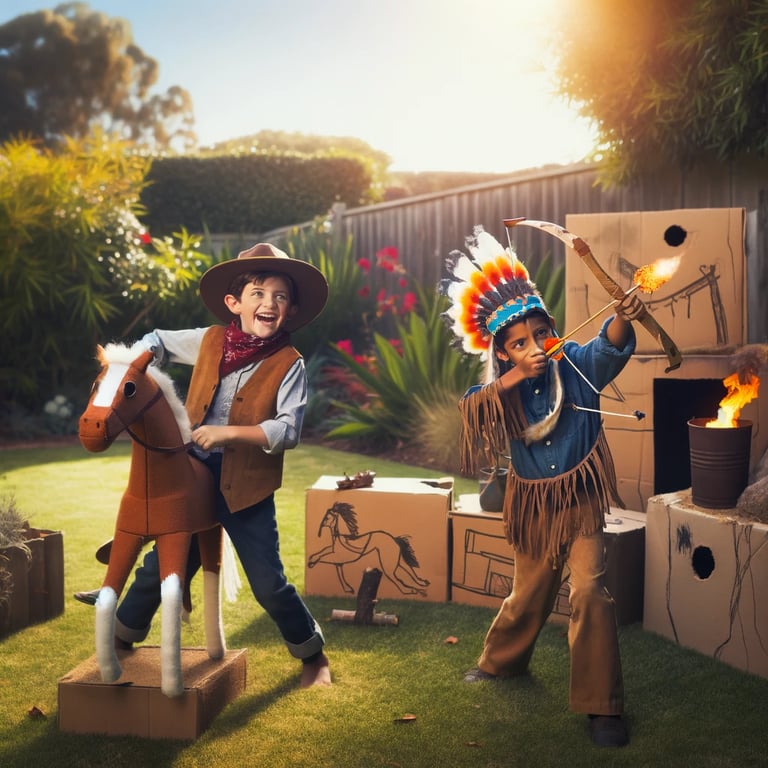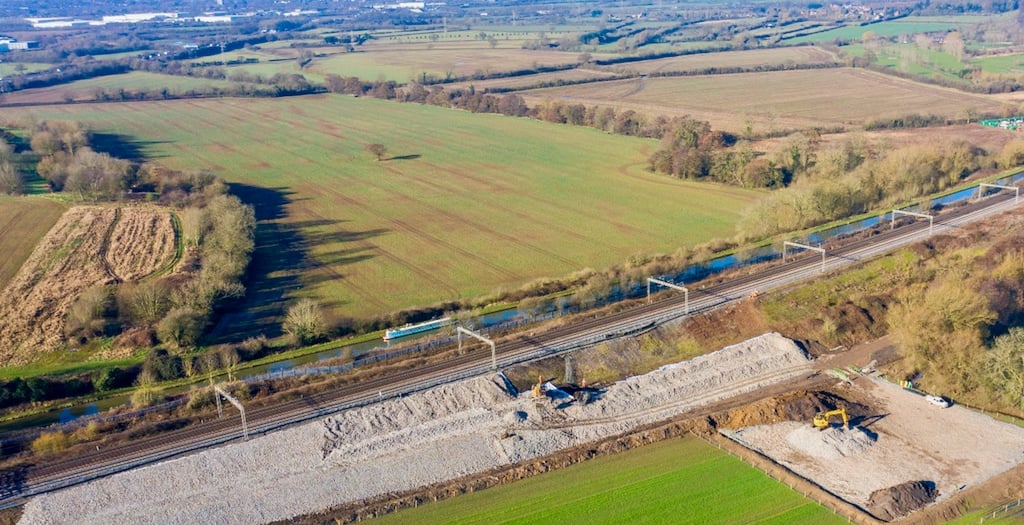Fiery Mischief
A Childhood Tale from RAF Cosford
PERSONAL REFLECTIONS
Back in the spirited days of my youth at RAF Cosford, in the heart of Shropshire, nestled amongst rolling fields and historical echoes, adventure was never in short supply. I was six or seven, brimming with the kind of energy that could only spell mischief. My comrade in arms, a fellow sprite of chaos, Danny Riddell, joined me in our daily escapades, our imaginations our only boundary. On this particular day, we had set our hearts on a classic: Cowboys and Indians, a game inspired by the countless Westerns that flickered across our black and white television screens, casting long shadows in our minds.


He, armed with a trusty popgun, took the mantle of the stoic cowboy. I, adorned with my bow and arrows, assumed the role of the noble Indian. Our battleground was the vast expanse of RAF Cosford, which, to our young eyes, transformed into the rugged landscapes of the Wild West. Yet, it was not enough to simply play the parts; I yearned for authenticity, for a spark that would bring our game to life.
The bullrushes by the stream, with their distinctive shape and form, suddenly demanded my attention – eerily reminiscent of the arrows used by the iconic characters from my cherished cinematic adventures. A spark of youthful imagination was kindled within me, a blend of innovative spirit and, regrettably, a youthful oversight of the inherent risks. Fuelled by the exploits of my screen idols, I embarked on a creative journey to replicate their legendary armaments for our own ambitious play.
These arrows I fashioned were far from ordinary; they were a testament to my inventive spirit, with the heads of the bullrushes carefully attached to their ends, allowing just the pointed tips to protrude menacingly. I had engineered them specifically for our re-enactment of a dramatic and perilous scene – an attack on a circling wagon train of pioneers, much like those we had seen in films on our black and white TV’s. Each arrow, with its diesel-soaked tip, was crafted to emulate the fiery weapons wielded by the Indians in those epic on-screen battles, bringing a piece of cinematic history to life in our own backyard adventure.
2021 upgrade of the embankment at Cosford
Uniquely, a railway line slices through the camp, perched upon a raised embankment, an unusual feature that connects the base directly to the pulse of England's transport veins. This line, part of the broader Wolverhampton to Shrewsbury route, served the strategic needs of the RAF. The embankment stood as a silent sentinel, witnessing the passage of time and tales untold, a vital artery in the landscape of RAF Cosford. This was to be the scene of our Little Bighorn. The railwayman’s hut, standing solitary on the embankment, was unwittingly cast as a pioneer’s wagon.


With the backdrop perfectly framed by fate, I catapulted myself into the fray, the air around me thick with tension. It was as if time had chosen this moment to paint its masterpiece, my actions the brushstrokes on nature's canvas. The flaming arrow, my unwitting accomplice, cut through the air like a comet hurtling through a cobalt sky, its trajectory a perfect arc crafted by unseen hands. As it descended, it carried with it the weight of impending doom, its tip aflame with a wrath born of fire and steel.
The moment it met its mark, with surprising accuracy, the world seemed to stand still. The tar-laden roof, unsuspecting in its quietude, became the unwilling recipient of this fiery messenger. In an instant, the hut transformed, its once inert exterior now a writhing, living entity, consumed by a hunger insatiable and fierce. Flames licked the air with the greed of a thousand starving beasts, the roof now an unwilling torchbearer, a beacon of disaster in the tranquillity of the wilderness.
The transformation was terrifying in its intensity, the quietude shattered by the crackling of fire, the air filled with the scent of tar and smoke, an unforgettable smell. The flames, once mere whispers, now roared with the voice of a tempest, painting the sky with strokes of orange and red. The hut, once a mere structure of wood and tar, had become the epicentre of a catastrophe, a spectacle of destruction that held a hostage in its fiery grasp.
The realisation of our folly descended upon us with a merciless clarity, striking as hard and fast as the flames that now voraciously claimed the embankment. In that moment, the scales fell from our eyes, and we saw ourselves for what we truly were – mere children, naïve and woefully unprepared for the gravity of our actions. We stood, frozen in horror, as the fire spread with a ferocious and untamed energy, its hunger amplified by the dry, brittle grass and fanned by a gentle yet treacherous breeze.
What had begun as a game, innocent and light-hearted in its inception, had quickly mutated into a nightmare scenario, spiralling beyond the realms of our childish foresight. The flames, once small and seemingly manageable, now danced with a wild and destructive grace, casting shadows that turned our playground into a battlefield. The fire, emboldened by the wind's whispering encouragement, leapt and twirled with a life of its own, a terrifying spectacle of nature's unchecked power.
As the fire grew, so too did the gaping chasm of our helplessness. We were ill-equipped, possessing neither the knowledge nor the means to stem the tide of destruction we had unwittingly unleashed. The reality of our situation was stark, laid bare in the harsh light of the flames – we had triggered a disaster far beyond our infantile capacity to rectify or comprehend.
The embankment, once a mere backdrop to our youthful adventures, had transformed into a raging inferno, a testament to our ignorance and a stark monument to the unintended consequences of our actions. We could only watch, hearts pounding and filled with a growing sense of dread, as what had started in innocence rapidly evolved into a dire predicament, far beyond our control.
Panic, raw and visceral, surged through our veins like a wild torrent, setting our legs in frenzied motion. We fled, propelled not by courage but by sheer, unadulterated fear, from the relentless advance of the flames, from the stark, unforgiving reality of our thoughtless actions. Between us, a silent pact was forged in the white heat of terror, an unspoken agreement to escape the consequences that were rapidly consuming the world we knew.
But innocence, once shattered, proves as elusive as shadows at dusk; it cannot be reclaimed by mere footsteps, no matter how fast or how far. Our desperate flight, though instinctual, was tinged with the bitter knowledge that we could not outrun the truth of what we had done. Every gasping breath, every pounding step, was haunted by the loss of our untainted past.
In the distance, the wail of fire engines sliced through the cacophony of our own racing hearts, a grim underscore to the folly of our mischief. The sound, both ominous and reassuring, served as a stark reminder of the real-world implications of our reckless escapade. It signalled the arrival of help, yet also marked the moment our youthful indiscretions collided with harsh reality.
The shrill cry of the sirens grew louder, more insistent, as if in direct conversation with the crackling fury behind us. They were the harbingers of consequence, the bearers of retribution, racing against time to undo the chaos we had unleashed. With each wail, the weight of our actions bore down upon our shoulders, a burdensome reminder that the path back to innocence was forever barred, sealed off by the very flames we had set in motion.
Our secret, however, was not ours alone to keep. My companion, burdened by guilt, unveiled our deed. The veil of anonymity lifted, I faced the consequences laid out by my parents—a stern reprimand from my father that paled in comparison to the weight of my own guilt.
In the pages of my childhood, this incident remains a vivid tale, a stark reminder of the fine line between adventure and recklessness. Those days at RAF Cosford, filled with the innocence of play and the harsh lessons of reality, shaped the contours of my character. Through the lens of time, I see not just a mischievous boy, but a young soul navigating the complex dance of growth and understanding.




